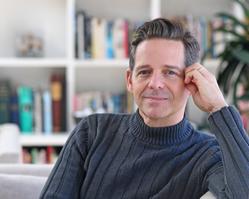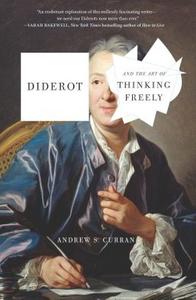
|
|
| photo: Olivia Drake | |
Andrew S. Curran is the William Armstrong Professor of the Humanities at Wesleyan University in Middletown, Conn. Early in his career, he wrote two books on the history of medicine, the second one, The Anatomy of Blackness, a sweeping history of how the concept of "race" crystalized during the 18th century. More recently, Curran has turned his attention to the French Enlightenment genius Denis Diderot with Diderot and the Art of Thinking Freely (Other Press, January 15, 2019).
On your nightstand now:
I tend to drop physically or intellectual heavy books on my face when falling asleep. Nighttime is therefore a time for e-reader crime or mystery novels. I have a particular fondness for anything written by John Sandford, a writer to whom I essentially subscribe. This week I'm reading his Holy Ghost. Queued up are John le Carré's A Legacy of Spies, Mindy Mejia's Leave No Trace and Tana French's The Witch Elm.
Favorite book when you were a child:
Growing up in the 1970s, I loved William Pène du Bois's The Twenty-One Balloons, the story of a retired schoolteacher whose hot-air balloon crash lands on the volcanic island of Krakatoa, where he discovers a secret and sophisticated society financed by the island's diamond cartel. Surely now a problematic fave full of unrepentant money-grubbers, colonialist overtones and class warfare.
Your top five authors:
In my personal pantheon, I would first induct two writers, the polymath Denis Diderot and the essayist Michel de Montaigne. Both are lifelong companions that grow old with you. I am particularly attracted to Diderot the freethinker, novelist, art critic, political theorist and writer who turned philosophy into a cudgel. After Diderot and Montaigne comes a far less jovial figure, Gustave Flaubert, a writer whose realist narration is particular in its ability to make the reader suffer through his ironic views of 19th-century life. (His Madame Bovary and Sentimental Education should be read every two years.) In an entirely different vein, I would next induct Toni Morrison, whose Song of Solomon was the most powerful book I read in college by far. Finally, there is Richard Russo, who writes so beautifully (and painfully) about the place I grew up, upstate New York, that I feel like I am sometimes reading memories I didn't have.
Book you've faked reading:
My son recently gave me Michael Pollan's How to Change Your Mind. I loved parts of this, but I couldn't do it, even in micro-doses.
 Book you're an evangelist for:
Book you're an evangelist for:
Robert Graves's I, Claudius. One of the greatest feats of historical fiction ever produced.
Book you've bought for the cover:
Tony Horwitz's Blue Latitudes. I was drawn to a small image of Captain Cook's ship artfully perched on our globe.
Book you hid from your parents:
My parents were intellectual libertarians. They let me read anything. There was no hiding of prose or anything else.
Book that changed your life:
Alan Watts's 1940 The Meaning of Happiness. Time to re-read this wonderfully preachy synthesis of Eastern and Western mysticism.
Favorite line from a book:
I love Voltaire's biting epigrams and aphorisms. This one has been dancing around my mind for a while: "Nothing is more dangerous than ignorance and intolerance armed with power."
Five books you'll never part with:
Patrick Süskind, Perfume
Thomas Pynchon, The Crying of Lot 49
Vladimir Nabokov, Lolita
Gabriel García Márquez, Love in the Time of Cholera
Charles Baudelaire, Les Fleurs du mal (Flowers of Evil)
Book you most want to read again for the first time:
Joseph Heller's Catch-22.
Books you'd like to write:
For some reason, I'm increasingly interested in writing a biography about the ill-fated Louis XVI. Am also thinking about a satirical novel about academia, but every academic says that.

